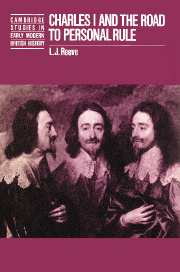Book contents
- Frontmatter
- Contents
- Acknowledgements
- List of abbreviations
- 1 Introduction
- 2 Buckingham's England in crisis
- 3 The death of a Parliament
- 4 The aftermath
- 5 Government and justice
- 6 The king, his court and its enemies
- 7 Foreign policy
- 8 Decision
- 9 The anatomy of a political transition
- Bibliography
- Index
- Cambridge Studies in Early Modern British History
5 - Government and justice
Published online by Cambridge University Press: 13 October 2009
- Frontmatter
- Contents
- Acknowledgements
- List of abbreviations
- 1 Introduction
- 2 Buckingham's England in crisis
- 3 The death of a Parliament
- 4 The aftermath
- 5 Government and justice
- 6 The king, his court and its enemies
- 7 Foreign policy
- 8 Decision
- 9 The anatomy of a political transition
- Bibliography
- Index
- Cambridge Studies in Early Modern British History
Summary
The proceedings by Charles's government against the imprisoned members of Parliament constituted the principal public issue in England during 1629. The case was of critical importance in the development of the personal rule. Charles's failure to secure a thorough political victory over the prisoners strongly contributed to his decided rejection of Parliament and war. Directly or indirectly the case involved the questions of prerogative taxation, the standing of Parliament, the legislation of the Petition of Right and arbitrary imprisonment, religious and foreign policy, and above all the question of respect for the royal authority. Eliot and the others, by carrying their activities from Parliament to the courts, mounted a major political revolt against the crown. This revolt, as Charles and his ministers understood, was a most dangerous threat to the regime, following hard upon the constitutional collapse it had served to precipitate. It coincided with a royal financial crisis, with a trade slump and a bad harvest, with delicate and desperate initiatives in foreign policy, and with a domestic atmosphere of conflict and disorder wrought by war and the course of the last Parliament. The government was under great pressure to neutralize the threat of the revolt, given the danger it posed to the stability of the state. Charles's treatment of the prisoners, moreover, suggests that he had not abandoned the idea of calling another Parliament. Yet the king instinctively differed with those members of Council who advocated a conciliatory attitude to the prisoners. The case laid bare the fundamental nature of his approach to government.
- Type
- Chapter
- Information
- Charles I and the Road to Personal Rule , pp. 118 - 171Publisher: Cambridge University PressPrint publication year: 1989

